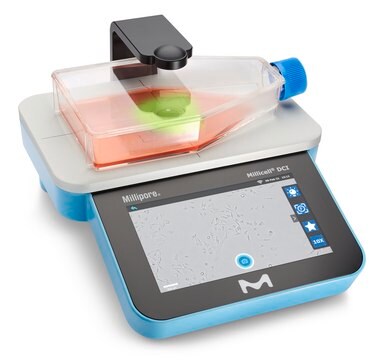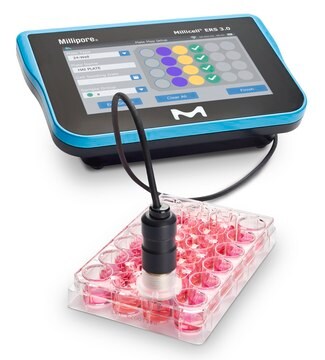PSHT010R5
Millicell® 24 well Plate
pore size 0.4 μm, polycarbonate membrane, sterile
Synonym(s):
24-Well Plate
About This Item
polycarbonate membrane
polystyrene
Recommended Products
material
flat wells
polycarbonate membrane
polystyrene
Quality Level
description
Polycarbonate cell culture insert with pore size of 0.4 µm used in a 24-well pate for cell attachment, cell culture, cell differentiation, drug transport & permeability.
sterility
sterile
feature
lid
manufacturer/tradename
Millicell®
parameter
50 °C max. temp.
technique(s)
cell attachment: suitable
cell culture | mammalian: suitable
cell differentiation: suitable
drug transporter assay: suitable
permeability assay: suitable
H
26.2 mm
L
128 mm
W
84.8 mm
filter diam.
9.5 mm
filtration area
0.7 cm2
plate size
24 wells
working volume
400 μL
matrix
Isopore™
pore size
0.4 μm pore size
input
sample type hematopoietic stem cell(s)
sample type neural stem cell(s)
sample type cardiac stem cell(s)
sample type mesenchymal stem cell(s)
sample type induced pluripotent stem cell(s)
sample type pancreatic stem cell(s)
sample type: human embryonic stem cell(s)
sample type epithelial cells
sample type: mouse embryonic stem cell(s)
binding type
Tissue Culture (TC)-treated surface
shipped in
ambient
General description
Application
Features and Benefits
- It possesses an apical assist and basolateral access for easy pipetting
- It has feet that elevate the plate above the work surface when disassembled from the feeder tray to prevent monolayer contamination
- Tear drop-shaped receiver wells to prevent air bubbles
Other Notes
Legal Information
Certificates of Analysis (COA)
Search for Certificates of Analysis (COA) by entering the products Lot/Batch Number. Lot and Batch Numbers can be found on a product’s label following the words ‘Lot’ or ‘Batch’.
Already Own This Product?
Find documentation for the products that you have recently purchased in the Document Library.
Protocols
This is a Toluidine Blue Staining protocol listing materials and methods.
This protocol covers three methods for the microscopic examination of cell samples.
This technical article covers the indirect co-culture of embryonic stem cells with embryonic fibroblasts.
This page covers the basic indirect co-culture procedure on both sides of Millicell cell culture insert membranes.
Related Content
This page covers the ECM coating protocols developed for four types of ECMs on Millicell®-CM inserts, Collagen Type 1, Fibronectin, Laminin, and Matrigel.
Our team of scientists has experience in all areas of research including Life Science, Material Science, Chemical Synthesis, Chromatography, Analytical and many others.
Contact Technical Service


![Ethyl 1,4,5,6-tetrahydrocyclopenta[c]pyrazole-3-carboxylate](/deepweb/assets/sigmaaldrich/product/structures/126/528/389deb8e-1d69-4e7d-95e4-c7bf30aa5474/640/389deb8e-1d69-4e7d-95e4-c7bf30aa5474.png)

